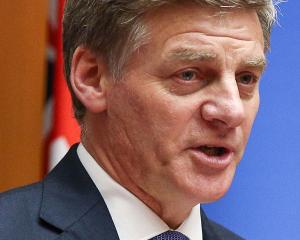The Road to Economic Salvation is not so much paved with good intentions as littered with countless, soon-forgotten "vision" documents and their worthy, but illusory promises of halcyon days ahead.
Who remembers Labour's Knowledge Wave? Or its imaginatively entitled successor Economic Transformation?
Likewise National's Path to 2010 back in the 1990s. Or, more recently, Don Brash's Act-instigated 2025 Taskforce.
And did anyone even notice National's 120-point action plan, which appeared out of the blue during last year's election campaign following Labour's taunts that the governing party lacked an economic development model beyond digging up the national parks in search of minerals?
That economic wish-list has now been superseded by a new (some would say recycled) Business Growth Agenda.
Such homages to economic growth - Mr Brash's more intellectually rigorous contribution being a notable exception - frequently turn out to be little more than overwritten statements of the bleeding obvious when it comes to suggesting what needs to be done to reinvigorate the New Zealand economy.
The fundamentals have not changed.
New Zealand remains a very small country a long way from anywhere else.
Many of the issues raised in Jim Bolger's Path to 2010 document - opening up new export markets, skills shortages, lagging infrastructure and so on - are still plaguing the country nearly 20 years later judging from the first two booklets of six due for release outlining National's Business Growth Agenda.
What has changed is a greater willingness to commit to targets, the principal one being an increase in exports from 30% to 40% of GDP by 2025, something which will be tougher to achieve than it sounds.
The creators of such vision documents usually have an ulterior motive, however. The material is often produced to fill the political vacuum when a Government has run out of manifesto promises to implement or has simply run out of ideas.
The purpose of such exercises is to show that government is very busy and focused on the country's long-term needs rather than short-term fixes.
However, the present exercise is not simply about National setting the agenda. It is also about National squashing any threat Labour might pose to National remaining the voters' preferred choice as manager of the economy in the lead-up to the 2014 election.
National knows it is vulnerable - particularly on economic growth, or rather the lack of it.
Ignoring the inexplicably high last quarterly GDP figure, growth has barely touched the 2% mark in the last couple of years.
This has yet to hurt National, however. This is in part because Bill English has used every opportunity to persuade people to look at what is happening in Europe and to lower their expectations accordingly of when the local economy will start to show signs of real recovery.
He has also sought to marginalise Labour by referring to the major Opposition party as "Planet Labour" - a place where the global financial crisis never happened and governments can still borrow at will. This tactic may seem corny. But it is simple and easily comprehended. It works.
Mr English also constantly harks back to Labour's last couple of years or so in power which were marked by large hikes in government spending. Labour has yet to convince anyone that it would be far more parsimonious next time, in part because it is not sure itself that it wants to be.
And with good reason. Come 2014 and the electorate may be sick and tired of National's ultra-orthodox, belt-tightening policies and start crying out for a dose of Keynesian-style stimulation of economic activity.
In the meantime, however, Steven Joyce, the other half of National's economic double-act, is doing his utmost to paint any Labour-Green government as anti-growth.
He is doing so by forcing voters to confront the fact that they cannot have growth without some detrimental consequences to the environment. He and National are punting that economic growth is the priority for most voters and they will thus come down on National's side of the argument.
Crucially, National's messaging comes in short sound-bytes. It wants economic growth. But bad times make that difficult. Labour had good times.
Labour squandered the opportunity.
Labour's pitch is more complicated.
It lacks a pithy label like "Planet Labour" to pin on National. Labour's latest effort - an "economic road test", of National's record since it returned to power - is at least a start. Labour makes much of unemployment being up by 57,000 under National. But this increase follows historic lows. In short, job losses are not at levels where people fear they will be next.
In contrast, the economic indicators which really matter to people - namely those showing the squeeze on their wallets - have arguably run in National's favour.
Economic modelling by Treasury shows that the stimulatory effect of policies which saw National - to use its own language - take the rough edges off recession through tax cuts and not slashing income assistance for families is now abating. The economy is now instead coming under pressure from domestically induced contractionary forces brought on by cuts in Government spending. Those forces will only be further strengthened as National gets closer to its target date for getting the Government's books back into surplus. Meanwhile, the much-vaunted Christchurch rebuilding has still to come to the rescue on the other side of the ledger.
Add a couple of further international shocks - such as a major slowdown in the Chinese and Australian economies - and National campaigning on its economic record in 2014 begins to look more than a little problematic, vision document or no vision document.
Hence the skirmishing now between the two major parties to gain the early advantage.
• John Armstrong is The New Zealand Herald political correspondent.




